Siberian Huskies are beautiful dogs. They look like wolves, and have thick, soft coats, that make them infinitely cuddly. They have piercing eyes, and wonderful masks, that give them a roguish and unique look.
Siberians can make very good family pets. If properly trained, they can be very good with people, children, and other dogs. Indeed, Sibes are commonly known for their friendliness toward people.

Although they may look like fierce wolves, they have the heart of Casanova. All my Huskies want to do, is greet everyone and give them licks.
However, many people have trouble with this breed, and many Sibes get surrendered every year.
Consider these Siberian Husky facts, before going out and getting a puppy. The Siberian Husky is a very special and lovable breed, but they may not be the right breed for everyone.
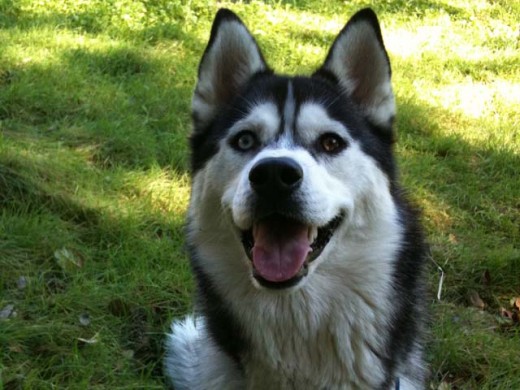
1. Siberian Huskies Shed a Lot!
Be ready to have dog hair all over the house – floors, carpets, clothing, furniture, everywhere.
If we are allergic to dog hair, or like our home to be very clean, then the Siberian Husky is not for us.
When I was looking for a Sibe, I talked to a few breeders in my area. The first thing they all said was, “Siberians shed a lot”. I mentioned that my other dog, a Shiba Inu, also has a double coat, and also sheds a fair amount. However, they all said, “Siberians shed a lot more”.


And they do! A whole lot more.
Therefore, it is very important to train our Husky puppy to enjoy the grooming experience.
- I start with a soft brush, and lightly comb my dog’s body for a short period of time.
- I do this often, and pair it with food rewards.
- Once my puppy is comfortable with the brushing process, I very slowly extend the length of our grooming session.
- Finally, I repeat the process with a more solid brush, such as the Furminator.
Frequent brushing is a good idea to keep our Husky clean, and clear out loose hair. The more hair on the Furminator, the less hair on the floor.
About twice a year, my Sibes blow their coat. During this time, there will be more fur than ever. To keep things under control, I try to brush every day. Remember to always keep brushing sessions fun, rewarding, and not overly long.
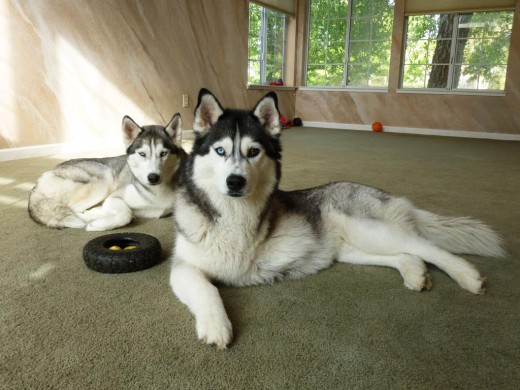
2. Siberian Huskies Make Awful Watch Dogs
Because Huskies look like wolves, many people assume that they are fierce dogs. Some people may even think that they are wolf hybrids.
However, a Sibe is more of a lover and less of a fighter.
When confronted with a stranger, my Husky will usually run up to him, give licks, and beg for food. As a result, Sibes do not make very good watch dogs. They will not only welcome everyone into your house, but will also give them the royal lick treatment.
If we want a dog that is only loyal to us and our family, then the Siberian Husky is not for us.
My Huskies are naturally happy and trusting dogs, who like to be with everyone. That is one of the things that I love most about them.
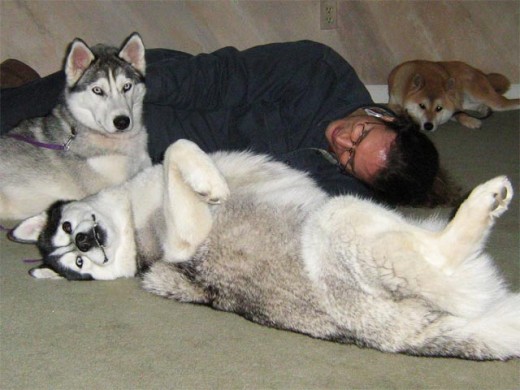
The Siberian Husky is not a watch dog, although those ignorant of his true nature may be frightened by his appearance. If you want a dog with aggressive guard-dog instincts . . . don’t buy a Siberian.
~~[SHCA]Leave your home in the care of a “guard” Siberian and he will most likely welcome an intruder with open arms, fetch (for the first time in his life) your valuables and show him the best route of escape–after all, Siberians are great escape artists.
~~[Siberian Rescue Site]
Note – This does not mean that Huskies will never be aggressive toward people. A dog’s behavior is determined both by genetics (breeding), as well as by training, socialization, context, and past experiences. A dog may become aggressive as a result of improper training, bad social experiences, insufficient socialization, and more.
For reasons of safety, it is important to ensure that our companion dogs are not people aggressive. Most companion dogs today guard us, by sounding an alert when unknown or strange people come close to our house. These dogs are not people aggressive. They do not bark, lunge, or growl at passers-by during walks. They are not aggressive toward guests and unknown visitors, who may need to work in or around our house. Their job is simply to alert us, when unusual events occur close to home. Anything more would quickly become dangerous and risky.
Highly trained guard dogs, such as those employed by law-enforcement, may be trained to attack or restrain an intruder. However, they are always under the control of their handler, are extremely well managed, and will only attack on-command or when they think their handler is in clear danger (as defined during training). They also do not bark or growl at pedestrians.
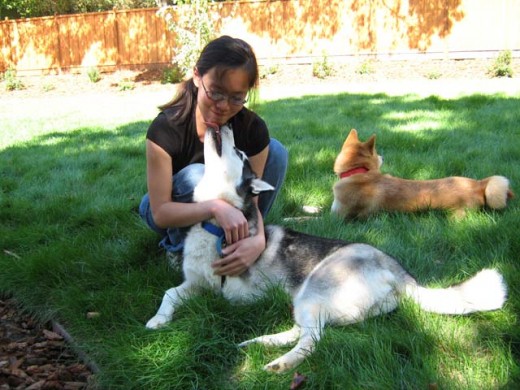
3. Siberian Huskies Have High Energy
They are intelligent, athletic, and were bred to pull sleds for extremely long distances, in the freezing cold. Therefore, be prepared to provide a Husky with a lot of mental and physical exercise.
A young Husky needs activity almost all day round. At around one-year old, my Sibe puppy sleeps for perhaps 3-4 hours during the day, and about 10 hours during the night. That leaves about 10 hours during the day where she is on the go.
She drains her energy most by playing with my other dog, a Shiba Inu. However, even my Shiba cannot fully keep up with her.


In addition to the playing, she works for all of her food, has long walks in the park several times a week, has structured dog play sessions, dog obedience training sessions, and still has energy left over to explore and dig in our backyard.
If bored, a Husky can become unhappy. He will likely escape, or use our house and belongings as chew toys. Unless our backyard is extremely secure, he can easily jump over or dig under a fence, in order to find adventure elsewhere.
If we are away at work for most of the day, then the Siberian Husky is probably not for us.
Siberians like having company and activity all day long. It is possible that a Husky can keep himself occupied if we have other dogs, but he may also lead our entire pack into mischief!
Sibes do best when there is frequent human supervision, throughout the day.
Siberians are a gregarious lot and need the company of other dogs or of people at all times.
~~[SHCA]The Husky needs lots of exercise and entertainment. They love to run and play, but must be allowed to do so safely.
~~[Hillside SPCA]

4. Siberian Huskies Are Independent Thinkers
They have a very independent mind and spirit, and will only perform, if we make it worth their while.
If we want an obedient dog that only lives to please us, then the Siberian Husky is not for us.
A Sibe is not a “yes sir, no sir“, kind of dog. To live well with him, we need to be fair, but firm. We need to consistently enforce our house rules, or he will take over the house.
The best way to train a Husky, is through the control of resources. Teach him that the best way to get what he wants, is to first do what we want. I use reward obedience training, and follow the Nothing in Life is Free program. Harsher techniques can make a Siberian distrustful, and ruin the natural free spirit of the breed.
Huskies are independent hunters. Their original breeders, the Chukchi of Northeastern Asia, would let their dogs free during the summer months to hunt for food on their own.
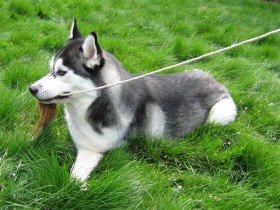
This has two very important consequences for living with a Husky today –
- A Siberian is not to be trusted with cats or other small animals. He can be trained to live with cats, but his instinct is to hunt them;
- A Siberian is not to be trusted off-leash. If he sees a small animal, he will likely bolt after it, and forget about cars, commands, and everything else. By the time he comes to his senses, he may be lost and far from home.
I have gotten a few comments about cats lately, so let me be clear …
Sibes can be trained to live with household cats. However, they usually have high prey drive, and will likely want to hunt and chase small animals, including squirrels, mice, and cats. Just because a Siberian gets along with our house cats, does not mean he will treat other neighborhood cats in the same way.
Huskies are bred to run and pull. This makes them more difficult to leash train than many other breeds. To train a Husky to walk on a leash, we need to have an immense amount of patience. Always be firm and consistent with the no-pulling rule, and reward good behavior.
If we do not have a large backyard, bring our Sibe to an enclosed park or soccer field, so that he can have some nice off-leash time to run, run, run.
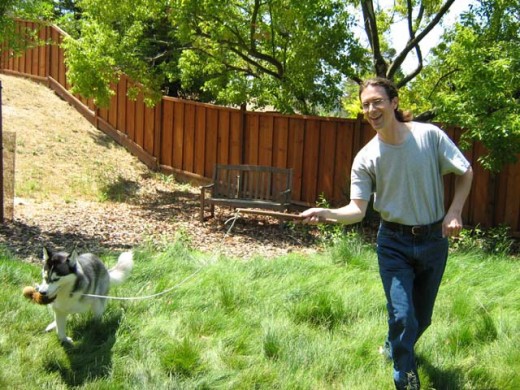
5. Siberian Huskies Are Not the Easiest Dogs to Potty Train
Certain dogs, like the Shiba Inu, are naturally clean and absolutely do not like soiling their living space. Because of their natural cleanliness, they are extremely easy to house train.
Sibes do not have that natural sense of cleanliness. In fact, they do not mind playing, and running around in their own waste products. Therefore, we must make it worth their while to potty outside.
Supervise our Husky puppy at all times, until he is fully house trained. Reward him well for pottying outside with high priority dog treats, play, and praise. If we are consistent with our puppy potty training, he will learn quickly, and be happy to go outside after a few weeks.
In addition, as Gigi points out, potty training difficulty is very dependent on what the dog or puppy is used to, in his previous environment. Puppy mill and pet store puppies are caged, most of the time. As a result, they will be harder to house train, because they are accustomed to going in their crates.

Where to Get a Siberian Husky Puppy
If we still want a Husky, then visit the Siberian Husky Club of America for a breeder list. Also consider adopting one from a local Husky rescue.
It really makes a BIG difference to get a puppy from an accredited breeder.
Please do not buy a puppy from online puppy sites or pet stores. Most of their puppies come from backyard breeders or puppy mills. Buying from them, will only help support and continue the dog cruelty of these unscrupulous puppy breeders.
If we are concerned about the initial cost of a puppy, consider that backyard breeders and puppy mills frequently produce unhealthy and unbalanced puppies. They will end up costing us a lot more, in terms of vet bills, dog training bills, and property destruction.
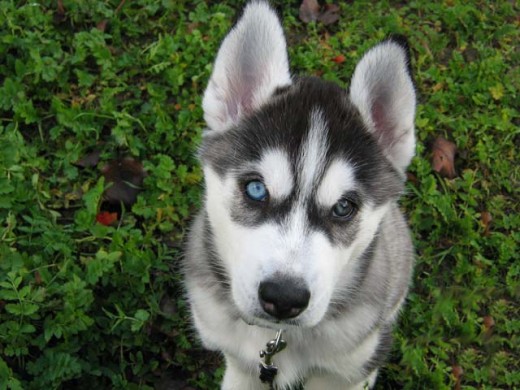
Siberian Huskies Are Wonderful Dogs

I love my Sibes. However, just because I think Huskies are wonderful dogs, does not mean that everyone else will think so as well; nor does it mean that they will fit into someone else’s lifestyle.
Clearly, each dog is an individual and will differ in terms of prey drive, energy level, obedience, and more. However, general breed characteristics and information from reputable sources, will give us a better idea of what to expect.
Often, there is conflicting information on the web. Therefore, one good place to start is with the AKC-recognized national breed club – The Siberian Husky Club of America.
Captivating in their beauty, grace and childlike demeanor, Siberians catch the eye of adults and children alike. They can be wonderful dogs for the well-informed or experienced Husky owner. However, they are NOT the breed for everyone and definitely not for first time dog owners. Too many wind up lost, in shelters, killed on the highway, abandoned or abused because the owner didn’t understand the breed and it’s challenging traits.
~~[Hillside SPCA]
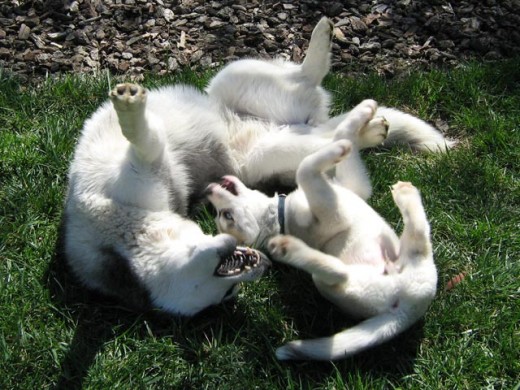
Blue is 20 months. I live in the country with no neighbors. I have 20 acres with National Forest on 3 sides of me. Do I need to keep him on a chain or in a fence? I’ve also had him neutered Thanks.
Sorry 20 weeks lol.
With my dogs I use a 6 foot fence. I also put concrete blocks all along my fence line to prevent digging. My Huskies love to dig. I *would not* do chaining, as that can lead to frustration and other bad behaviors.
http://usatoday30.usatoday.com/life/lifestyle/pets/2009-08-12-stilwell-dog-chains_N.htm
Fencing can be expensive, so one possibility for large properties is to fence up a smaller area, and create a smaller play and hang-out area. Then, we can go on supervised walks with our dog to explore the rest. I would not let my dogs roam unsupervised because there are rattlesnakes in my area, coyotes, raccoons, etc.
A dog can also get worms or get sick from drinking contaminated water and eating leavings from other animals. My Husky used to hunt mice and other things at night, and she got worms from that.
Lol so kawaii
I have a husky, but he doesn’t like his kennel , he kept on refusing to go back to his own kennel this few days after a walk , and he often tries to play with other dogs but he’s a bit too raugh and I don’t know if it’s okay to let him play. Can you help me solve this problem ?
What is his daily routine like? How old is he? How long have you had him for? How many other dogs are there? What kind – size, temperament?
How I crate train my dog.
How I set-up play-time rules for my dogs.
So I am wondering, today I took my pup 8 mo. On a 12 mile bike ride, which he loved, but wore him out, he’s currently passed out at my feet, and from his normal behavior after a big run will be LESS active until tomorrow. What I am wondering is I want to do a 30-40 mile bike ride. And I’m wondering if this will be too much for him. I will have back up if either of us gets too tired to carry on but I just worry about over working him, however the husky is known to go long stretches pulling. Any thoughts?
Personally, I would gradually build up the distance from what my dog is currently comfortable with. Jumping from 12 to triple that is not something that I would risk in one go. I would also consult with a vet to see if that kind of distance is ok for a still growing and developing pup. However, I don’t do such long runs with my dogs, so I don’t have much experience here.
With my Huskies it also depends a lot on the temperature. They don’t do well when it is too hot or too humid. Of course I always take lots of water with me and make sure they are properly hydrated.
I wanted to build him up, I don’t want to just jump into a run that will be more than his normal distance. I was just wondering if it would never be a good idea for him ya know what I mean?I guess I could build him up and base my judgment off of it, but I wanted to see if anyone else ever does very long distance trails with their dogs. 🙂
Yeah, I figured you knew your stuff, but I have learned that is it best not to make too many assumptions, especially in an online context. 🙂
Here are a couple of discussions by people who run their Huskies.
http://pets.stackexchange.com/questions/7788/how-long-distance-should-i-exercise-my-husky-puppy
http://www.husky-owners.com/forum/topic/51160-huskys-running-distance/
My Huskey is a sweetheart when i come home and a an evan bigger one when i am gone she is alwats on and alowed on my bed
I have a new dog called Eski. The problem is I have no space for this husky. He is tied in a small room only at night. Is this safe for him?i don’t have a yard. thank you
At night, I have my new dog with me in the bedroom. This helps with bonding, and also helps with the transition to a totally new environment with totally new people, which can be very stressful for a dog. Also, if there are any issues, I am right there and can take care of it. I use a crate if necessary, but I crate train my dog first.
https://www.aspca.org/pet-care/virtual-pet-behaviorist/dog-behavior/weekend-crate-training
I only tether my dog when I am right there to supervise. I do not leave my dog alone when he is tethered, because the lead may catch on something, he may get into a bad position that is difficult for him to get out of, or other unforeseen difficulties may arise. If I need to confine my dog when I am not around to supervise, I use a safe, properly sized crate or some other safe enclosure.
Would it be in my husky’s best interest to get another dog that is very similar to him? He always tries to play with other dogs and is very friendly.
http://shibashake.com/dog/getting-a-second-dog
Hello. I’m planning to adopt a husky and can you please give tips about huskies? Things about huskies and training them and just basic things about them?
http://shibashake.com/dog/siberian-husky-facts
http://shibashake.com/dog/how-i-trained-my-husky-puppy
I talk more about my experiences with training my Huskies here-
http://shibashake.com/dog-training
I really need some help with my husky. She’s a very friendly loveing dog. She loves people and other dogs her size or bigger, but when she sees a smaller animal doesn’t matter what she wants to attack it. I haven’t really seen her go after anything other than when a stray mix smaller go is around our house or once when my sister in law brought her small dog over. I’m sure she goes after rabbits and what not but I don’t like the fact that she tries to attack small dogs. Please help!!
With my dogs I do desensitization and counter-conditioning exercises to get them to be less reactive around other dogs. In order to be safe and effective, desensitization exercises have to be done in a structured environment, and in a very specific way. Therefore, we did exercises at our local SPCA, under the direction of a trainer, and with trainer chosen dogs.
http://shibashake.com/dog/dog-to-dog-aggression#desensitize
More on dog prey drive.
More on desensitization and counter-conditioning-
https://www.aspca.org/pet-care/virtual-pet-behaviorist/dog-behavior/desensitization-and-counterconditioning
its the nature of the breed. I’ve got two dogs and they wouldn’t hurt a fly (okay not exactly a fly but still good) but try to put them on short lead so they get used to NOT attacking smaller breeds. Try it
We have a 3 yr old female husky. She is tolerant of smaller breeds and that is in part because we have taught her to differentiate between prey and play. We have a Chihuahua that she loves, but doesn’t hesitate to let him know when his behavior annoys her. When I first adopted her, I socialized her with all the dogs in my neighborhood. I did this in order to teach her that there is no need for her to be aggressive. The downside to that is that some dogs don’t want to play, and as a pack dog, many huskies think all dogs are packmates. She learned quickly how to discern the difference. With smaller dogs, I introduced her to very dominant small dogs that would fight back if threatened. She wasn’t sure what to think of that, so now, any time there is a small dog around, she wants to play, and if I notice her getting too rough, I quickly intervene & halt the behavior. Consistent training to show your husky the difference will help alleviate the behavior. It takes time and constant reminding, but the behavior can be curbed, though maybe not altogether eliminated.
Hi, i just adopted a 6 mths 20KG female siberian husky last week. I don’t have many experience with dogs. How often should i bring woofie out?? What is the difference between dry and wet food? Do i have to buy both? How often do we need to bathe her? Do we need to brush her teeth? And how often? Can i just use human toothbrush? When i’m walking her she tends to smells everything on the floor, is she just curious or is she leaving her smell there?? I’m really worried about her as she have some skin problems too, and afraid that it might be a wrong choice to adopt her as i might not have the time to take care of her 24/7. Oh yeah how long does a puppy sleeps a day?
Wet food I mostly use in frozen Kongs to keep my dog engaged. Most of the time I use a high protein, grain free kibble. During puppyhood, I use puppy formula kibble.
More on how I pick food for my dog.
I bring my dog out when she needs to go. My dogs are potty trained, so they know to go to the door when they need to do their business. I also make sure to exercise my dog daily, and provide her with structured activity.
I brush my dog’s teeth with a dog toothbrush and dog toothpaste. *DO NOT* use human toothpaste. One of my Huskies has pretty clean teeth in general, so I brush her 3 times per week. The other one collects more gunk on her teeth, so I brush her every day. I take them to the vet for a teeth cleaning when they need it.
I brush my Husky’s fur pretty often, especially after a hike, to remove dirt, grass seeds, etc. There are ticks and fleas in my area, so I also make sure to check my dog for those, and I use a topical tick prevention product recommended by my vet. I don’t need to bathe them much at all. Last time I bathed my Husky was when she got skunked.
For skin problems, I try to get that resolved right away by taking my dog to the vet. I want to get that done as soon as possible before the problem worsens.
How long a puppy sleeps per day will depend on the puppy, his routine, temperament, environment, etc. Each puppy is different.